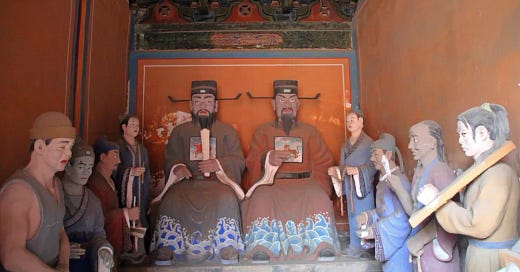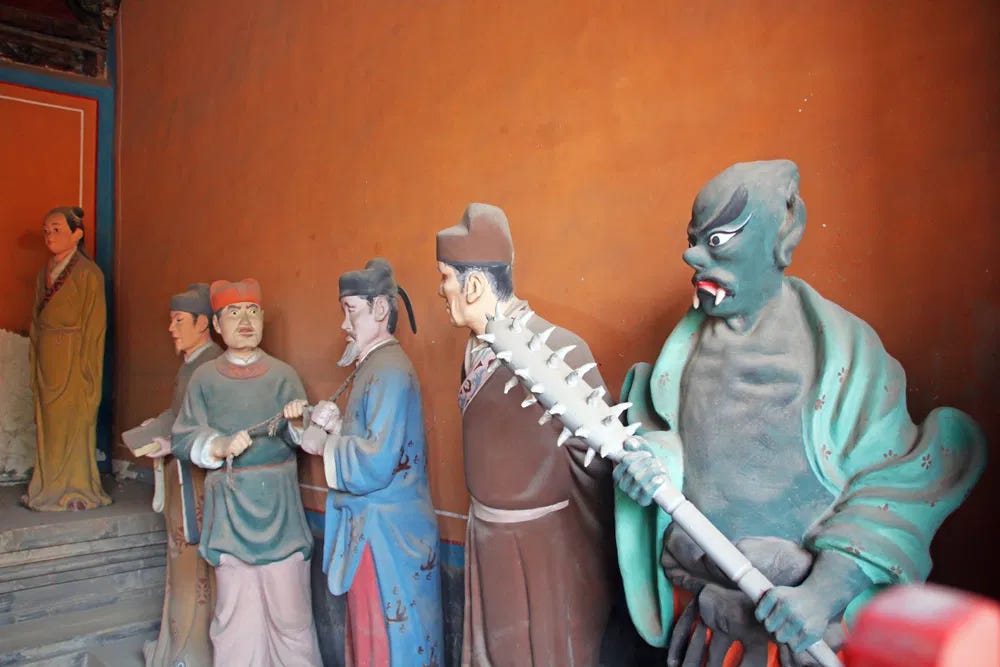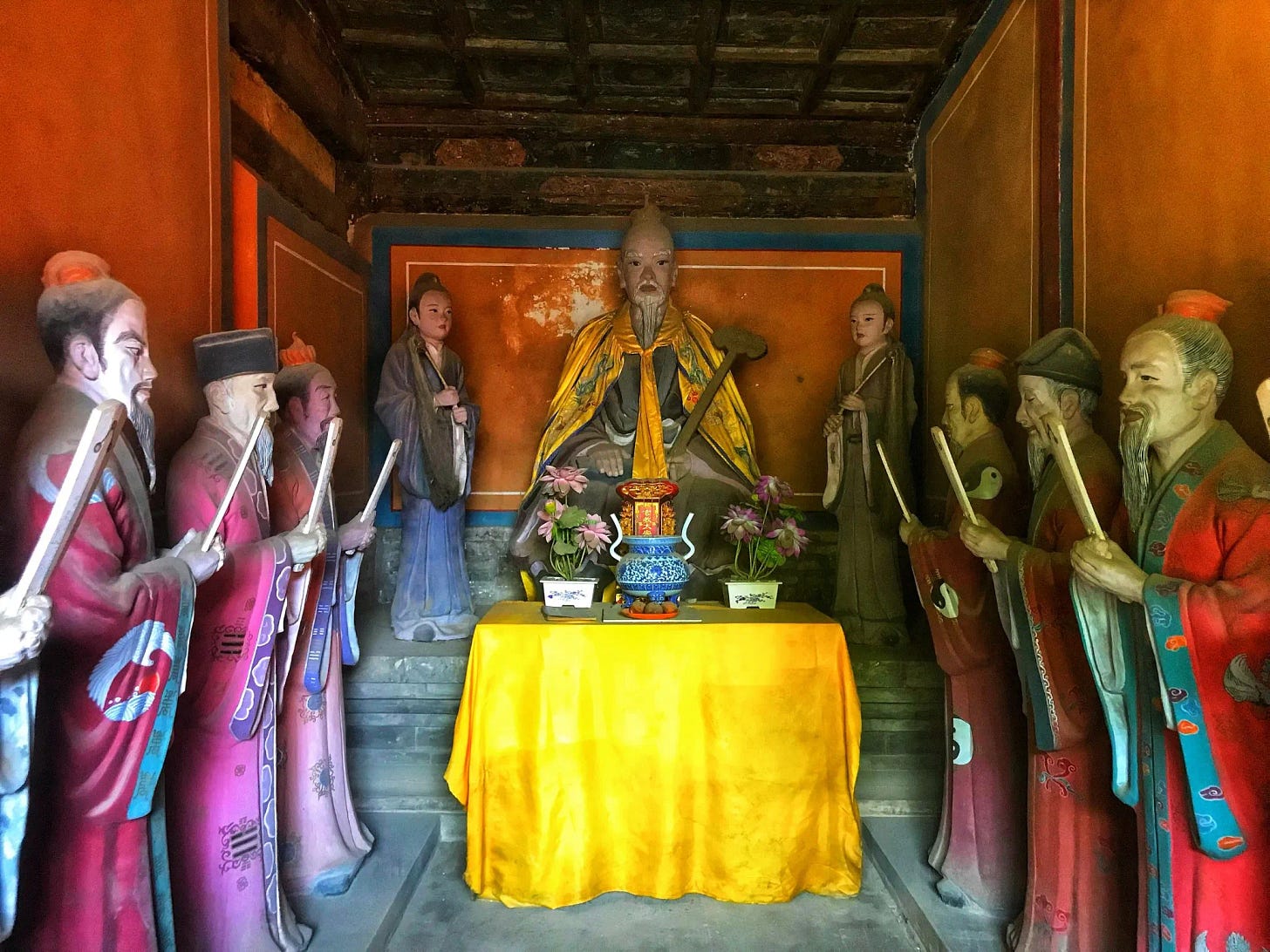Dong Yue Temple in Beijing
A Taoist heaven for middle-level bureaucrats with a penchant for paperwork in triplicate.
Hello Global Jigsawers,
Given all the vaxxies (vaccination selfies) that are populating my social media feeds, I can’t help but allow myself the teeniest hope that travel may be back on the agenda within our lifetimes. And so this post is about a little know Taoist temple in Beijing, which any China itinerary should (but never does) include. It’s delightful, not only for the glimpse it gives into the imagined Taoist hereafter, but also for what it reveals about China in the here and now. For China-watchers the temple is an excellent starting point in getting to grips with what makes the erstwhile Middle Kingdom tick tock.
I hope you enjoy the piece, and if you do, please subscribe. You’ll gain lots of good karma for afterlives of all stripes, Taoist included. And, if you choose to become founding members, I’ll even put in a good word with The Department of Petty Officials. Now how could you turn that offer down? Best deal going on Substack.
If you are unable to open your wallets, do open your social media feeds and share the Global Jigsaw with others. It remains free to sign up to and to read.
**************
The commonalities between the Taoist netherworld and that of the mortal nation of contemporary China may not be immediately apparent. However, a visit to Dong Yue temple, an unobtrusive building set off a traffic-choked thoroughfare in central Beijing, not only offers insights into this improbable connection, but further suggests that the help of a few Taoist Gods may be just what the doctor ordered to help China's leadership confront its most pressing challenges.
Taoism is deeply mystical and difficult to grasp for the layperson. Over the centuries its practice took on a hybrid form including Buddhist elements, Confucian ethics, and animistic rituals. Dong Yue is a product of this syncreticism. A stroll through its grounds reveals a religion that appears tailor-made for a country governed by the apparatchiks of the Chinese Communist Party, their professed atheism notwithstanding.
Dong Yue features a smorgasbord of Gods, Goddesses, Demons, Immortals and Saints inhabiting multiple realms of heaven and hell. The temple's shrines, 76 in total, are labelled "departments," and each department features a diorama with a head-mandarin Under Secretary seated comfortably atop a pedestal. Rows of supplicants bearing paperwork and offerings queue up along the sides. This is truly heaven for middle-level bureaucrats with a penchant for paperwork in triplicate.
Demon headed gatekeepers whose main job is to keep petitioners at bay from the badly lit rooms are only one additional feature that China’s bureaucratic here and hereafter share.
Pride of place amongst the temple's shrines goes to the Department of Signing Documents, which an explanatory plaque divulges is the department in charge of "all writing, authenticating, signing and sealing of documents."
And the red tape is only beginning. Next door is the Signature Department, the "headquarter of all signature departments in the nether world. Its function is to sign and approve documents or verdicts passed by different departments prior to their execution."
Located a few steps down the corridor is the Department of Petty Officials (who are ordered by the department chief to be "selfless, kind and benevolent" – unlike any petty officials I’ve ever come across). And next door is the Evidence Department for Issuing a Warrant, in charge of "investigating and collecting evidence to avoid harming innocent people".
When I first visited the temple almost 15 years ago, China had just returned the sole right to hear death penalty appeals to its Supreme People's Court after a gap of more than two decades. The reason: a slew of high-profile cases in which the authorities had mistakenly executed persons for crimes they were innocent of. I remember having almost been able to hear the Evidence Department for Issuing a Warrant's chief clucking his disapproval from above.
But this Department Head isn't the only one whose help the Chinese leadership could do with.
Among the more formidable challenges Beijing has long faced, are corruption and illegal land seizures. For Taoist Gods these are easily enough dealt with. Guilty parties in the hereafter are swiftly dispatched to the Department of Confiscating Unwarranted Property, whose purple-headed guardian monster bears a particularly nasty spiked mace.
Or in the case of venal bureaucrats to the Department for Official Morality in charge of ensuring that they are kept, "honest, resist corruption and enforce the law strictly."
As you continue your inspection of the temple you will eventually stumble across the Measurement Department, whose purpose it is to ascertain that "traders abide by rules of fair treatment and refrain from cheating by undercutting the weight and size of the merchandise." The Taoist hereafter certainly has better anti-dumping measures in place than China. The WTO would have granted it market economy status, no problem.
And as China's environment continues to suffer stress - the country has 37 of the world’s 100 most environmentally at-risk cities according to a 2020 report by risk consultancy Verisk Mapelcroft - the State Administration for Environmental Protection could take a leaf out of the playbook of the Taoist Department for Flying Birds, Department for Preserving Wilderness.
The Department for Implementing 15 Kinds of Violent Death (including clubbing, battle, fierce animals and revengeful murder), Department of Insect Birth (in charge of men who are reborn as cicadas, mosquitoes or flies as punishment for bad karma), and Department of Wandering Ghosts (responsible for ghosts that may have lost their way) are a little harder for Beijing to find practical uses for. But with some imagination (and of course a proposal signed and verified in quintuplicate) one never knows.
Now, this last year we’ve seen a ton of theories swirling around about the possible originsof COVID-19. To sneak another one in for the conspiracy theorists: there is a Plague Performing Department (in charge of “performing plague on miscreants”) at Dong Yue.
**************
Note 1: Dong Yue was built in the 13th century. It fell into disrepair after China's last emperor was overthrown in 1911, and was ransacked during the Cultural Revolution. For a few decades it served variously as a government office, a school, and even a dormitory for factory workers. In 1999, after a five-year-long restoration process, it was once again opened to the public, although as a museum of "folk religion" rather than as a functioning place of worship.
Note 2: I thought I’d end with these sage words from the man synonymous with the Tao:
Lao Tzu and Pallavi Aiyar (Tao Te Ching, chapter 56, translation by Stephen Mitchell and The Global Jigsaw, Substack, 2021)
Close your mouth,
Block off your senses.
Blunt your sharpness,
Untie your knots,
Soften your glare,
Settle your dust,
Subscribe to the Global Jigsaw ;-)
Zai jian until next week
Xo
PS: Do share a hidden gem in your favourite city in the comments section.







Brilliant and hilarious as always.
Hidden gem- London's charming Mews houses always trigger the imagination, making us wonder, where in other cities, did mansion dwellers park their horses, carriages, hay and helpers. Bathhurst Mews in Bayswater is the only remaining stable to this day.
Made my day!